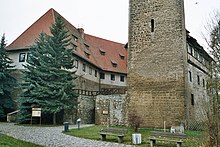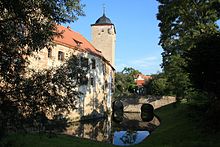Apel Vitzthum the Elder at Roßla
Apel Vitzthum the Elder of Roßla (* around 1400 ; † 1474 ) was a Saxon knight from the noble family of Vitzthume .
biography
The son of the knight Busso Vitzthum and Eyle von Ilburg was first mentioned in documents in 1425. After his father's death in 1437 he was in the service of Elector Friedrich the Meek of Saxony and held the office of court master.
Together with his father Busso and his older brother of the same name, he took over shares in the silver mine in Harzgerode from Dukes Friedrich, Siegmund and Wilhelm of Saxony as well as from Landgrave Friedrich of Thuringia on January 2, 1436 .
In 1439 and 1440 he and his brothers Busso and Bernhard negotiated for the elector in the so-called Plauen Irrung . In 1443 the elector sent him to Lausanne to conclude the marriage contract between Frederik's son Frederik (1439-1451) and Catherine of Savoy .
At the turn of the year 1444/1445, however, Apel left Friedrich's court in order to serve as a councilor to his brother, Duke Wilhelm . He also took up a position as court master with Wilhelm and played a highly inglorious role in the ensuing fratricidal war (1446-1451), which made him particularly hateful and in favor of the elector. Out of a purely personal lust for power, Apel Vitzthum incited the Duke against his older brother and drove him, together with some fellow campaigners, including Busse Vitzthum, Friedrich von Witzleben and Bernhard von Kochberg, into a murderous war that spanned large parts of Thuringia, mainly between Weimar and Wiehe , Merseburg and Dornburg / Saale , devastated. This led to Apel losing the rule of Lichtenwalde in Friedrich's sphere of influence, which he had acquired in 1439 in exchange for Klöden , in 1447. In 1447, however, Wilhelm took care of Coburg and other possessions.
1450 enfeoffed Duke Wilhelm III. his councilors Apel, Busso and Bernhard Vitzthum as well as Friedrich von Witzleben with the Kunitzburg near Jena on the Gleißberg, for which they undertook to repair the deserted and derelict castle. The duke was probably a slave to them. Taking advantage of his trust, they had already accumulated wealth and property to the detriment of their master, so in 1447 Apel received the maintenance of Coburg and other properties. The Wachsenburg was also given to Roßla as a pledge in 1441 by Apel Vitzthum the Elder, who gradually developed from the ducal council to the notorious robber baron and became known as the “fire chief of Thuringia”. He is made responsible for the outbreak of the Saxon Fratricidal War from 1446 to 1451, in the course of which he lost the Roßla Castle in 1447.
In 1446 the people of Erfurt entrusted him with the protection of their merchants in the Kapellendorf area and handed over the Kapellendorf moated castle and the associated office to him for a period of 21 years. In 1450, however, there was a break with Duke Wilhelm when he recognized the true role of this Vitzthume. Together with his brothers Busso and Bernhard, Apel Vizthum - who had fallen out of favor at the Saxon court - now turned against Landgrave Wilhelm III. of Thuringia and attacked Erfurt and other merchants several times. When an embassy from the Duke of Burgundy was on the way in October 1451 because of a planned marriage to the Saxon Elector Frederick II the Meek , it was attacked by the Vitzthum brothers, plundered and taken prisoner to Kapellendorf. The Saxon dukes, together with the cities of Erfurt , Sangerhausen , Mühlhausen and Nordhausen as well as the surrounding nobles, conquered the castles of Vizthume in Kapellendorf, Wachsenburg, Kunitzburg, Dornburg, Leuchtenburg , Isserstedt , Camburg and others. After a four-week siege of the Wachsenburg, during which the defensive wall of the castle was undermined (by Mansfeld miners), Apel Vitzthum was finally forced to give up. In December 1451 the sloz Cappilndorf , in which part of the Burgundian councilors were imprisoned, was surrendered after an eight-week siege due to a lack of food and ammunition and the defenders were granted free withdrawal. In exchange for the Wachsenburg , the water castle Kapellendorf came back into the possession of the city of Erfurt in 1452.
After the end of the fratricidal war, Apel Vitzthum was expelled from Roßla in 1452 and found a new job in Bohemia in 1453 as a councilor to the king there. There he also acquired the dominions of Klösterle and Neuschönburg .
Apel left four sons and a daughter. He was married to Kunigunde, who is named as his wife between 1434 and 1452.
literature
- Heinrich Theodor Flathe : Vitzthum, Apel from . In: Allgemeine Deutsche Biographie (ADB). Volume 40, Duncker & Humblot, Leipzig 1896, p. 83 f.
- Richard Freiherr von Mansberg: Mercy of the Wettin lands. Dresden 1905 to 1908
Individual evidence
- ↑ Ulrich Völkel: Gastliches Thüringen , Arnstadt 1993, ISBN 3-929662-00-0
- ↑ http://www.klippstein.net/wsbg/wachsbg.htm
| personal data | |
|---|---|
| SURNAME | Apel Vitzthum the Elder at Roßla |
| BRIEF DESCRIPTION | Saxon statesman |
| DATE OF BIRTH | around 1400 |
| DATE OF DEATH | 1474 |


